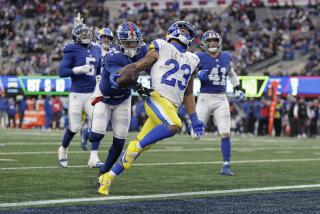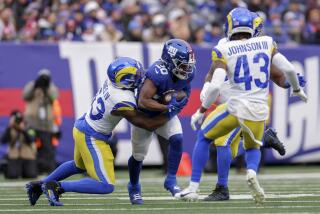COMMENTARY : It’s Small Plays That Are Toppling Giants
- Share via
EAST RUTHERFORD, N.J. — At their best, the success of the New York Giants could be measured in inches. This is a team without a dangerous wide receiver, with its finest running back still in the developmental stage, with a head coach for whom pro football is 60 minutes of hand-to-hand combat. The Giants won their first 10 games because they consistently made the tough yards on offense, consistently stifled opponents on defense.
During the last month, however, they have not consistently made the small plays on either side of the line. The result has been three defeats in their last four games and an erosion of confidence at the worst possible time. The Giants may already have clinched a division title, but the likelihood of achieving anything more satisfying in the postseason is fading.
It was not just the probable absence of Phil Simms for the foreseeable future that clouded the locker-room atmosphere Saturday in the wake of the 17-13 setback against the Bills. More critical than losing their quarterback, the Giants appear to have lost their way. “We’re really not playing together as a team,” veteran cornerback Everson Walls said. “We’re not helping each other out.”
He was talking about units as well as individuals. The Giants just missed downing a punt on the Buffalo 1-yard line late in the game. “The defense,” Walls said, “is not making plays to put our offense in good position. And the offense is becoming stagnant as well.”
The offensive problems are paramount now, particularly with Simms’ foot injury. But the identity of the quarterback was not a factor in the breakdowns that have bedeviled the Giants in short-yardage situations since the game against the Eagles in Philadelphia. Needing two or fewer yards for a first down on 10 occasions against Buffalo, they converted only three opportunities. And one of those was a fumbled center snap that Jeff Hostetler, Simms’ replacement, recovered for a gain.
Ron Erhardt, the offensive coordinator, called the short-yardage game “pathetic.” And Ottis Anderson, who scored on a 1-yard run in the first quarter but was snuffed on third down inside the Buffalo 5 to halt a third-quarter scoring drive, said, “We’re not executing as well as we did. We’re not making the plays we were when we were winning.”
Although the Giants’ offense would win no awards for creativity, it is a little late in the campaign for major changes in the system. But a team with such a small margin for error cannot make such mistakes as the holding penalty assessed on guard Bob Kratch in the course of a third-and-2 plunge by Rodney Hampton in the fourth quarter. Hampton appeared to be short on the dive, but the 10 yards changed the nature of the next call, and the Giants then backed out of field-goal range when Bart Oates snapped the slick ball wide of Hostetler, standing in shotgun formation.
“We misfired, messed ourselves up,” said Jumbo Elliott, the left tackle. “We blew the third-and-1 (on which Anderson was stopped for a loss of a yard), we came up with a holding penalty. We can’t do things like that.”
Six days earlier, the defense bailed out the offense with two critical interceptions in Minnesota territory late in the game. Lawrence Taylor had two such chances against the Bills -- the first of which likely would have resulted in a touchdown -- but couldn’t hold on to the ball. And the defense was dissatisfied with its reaction to Buffalo’s attempt to run out the clock.
With Jim Kelly at the throttle of a no-huddle attack, the Bills had scorched the Giants for touchdown drives on their first two possessions. But that did not upset nose tackle Erik Howard nearly as much as the third-and-5 play the Bills converted in the last three minutes. Thurman Thomas got the handoff, as expected, and burrowed through the line for five yards. Buffalo’s only first down of the fourth quarter kept the clock moving and forced the Giants to use their last remaining timeouts. That, in turn, handcuffed Hostetler in his desperate last-minute bid for the winning score.
“The same type of thing happened at the end of the San Francisco game,” Howard recalled. “If we had gone three plays and out, we could have bought more time for the offense.”
As currently constituted, it’s an offense that needs all the time it can get. Hampton is emerging as a prime-time runner but, beyond him, only Dave Meggett, a third-down back and kick returner, is a consistent threat to defenses. More and more, opponents are stacking their defenses against the run and short pass without getting burned.
“We’ve just got to get back on track,” said Stephen Baker, the only Giants wide receiver with as many as 20 receptions. “We are running out of time. I can’t pinpoint what’s gone wrong. We have to work on red-area plays (inside the opponent’s 20). We’ve got to get into the end zone.”
The Giants have scored exactly five touchdowns in four weeks, insufficient even for a team that boasts the best defense in the NFL. And the slide has occurred at a time when teams are trying to build momentum toward the postseason. Consider that before their lone Super Bowl appearance four years ago, the Giants won their last nine games of the regular season and scored no fewer than 21 points in any of the last four.
Now the best they can hope for is a two-game winning streak entering the playoffs. Considering their current plight, they’d take it. But unless a team with limited big-play capability can regain its knack for making the small play, even such a modest goal may be beyond reach.
More to Read
Go beyond the scoreboard
Get the latest on L.A.'s teams in the daily Sports Report newsletter.
You may occasionally receive promotional content from the Los Angeles Times.










